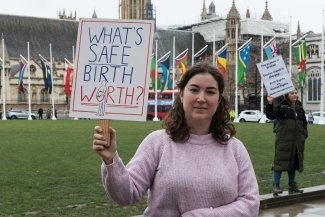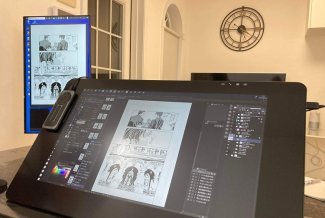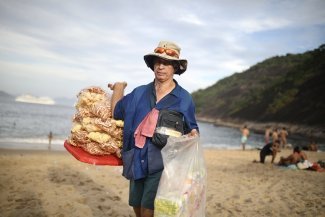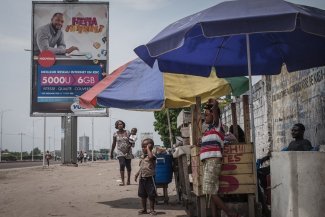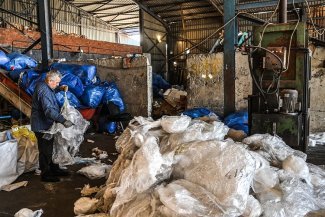Since the Tunisian Revolution, the LGBTQ community has been taking advantage of every opportunity to make itself visible and defend its rights, holding demonstrations on the fringes of events such as the World Social Forum of March 2015 in Tunis.
“Don’t reveal his true identity, his brothers will come and kill him!” The tone is set by lawyer Mounir Baatour, who receives us in his office in a chic suburb of Tunis. A committed activist, he is the president of Shams (Sun), the association that, since 2015, has been defending the rights of the lesbian, gay, bisexual, transgender, queer and intersex community (LGBTQI), such as a young man we shall call ‘Ramy’.
Ramy wishes to remain anonymous for safety reasons. He is tall and slim with dark hair and olive skin. His face is a picture of gentleness, but his smile is sorrowful – and with good reason. Ramy comes from a family of five children from the outskirts of Hammamet, his father is a municipal employee, his mother looks after the home. His childhood was trouble-free, except for the crushing secret he was forced to hide: he feels female.
The religious authorities in Tunisia, a Muslim country, consider homosexual relations to be a deadly sin. The state also condemns them. Since the penal code introduced by the French in 1913, ‘sodomy’ between consenting adults has been considered a criminal offence punishable by up to three years in prison.
Another legal weapon used against trans people is Article 226, punishing ‘indecency’, which the police and courts are free to interpret as they please.
Ramy, who quickly understood the risks linked to his situation, concealed his feelings and suppressed his appetite for wearing women’s clothes. But a friendship with another boy, who he considered a friend, led to the betrayal of his secret. It was his mother who, having noticed that the two young teenagers had become ‘too close’, told the family. From that moment on, Ramy’s life was turned upside down.
His father and brothers beat him black and blue, stopped him from going to school, shaved his head and, soon after, put him out on the street. He was only 15 years old at the time, and had just finished school. Spurned by his family and friends, he left everything behind and went to central Hammamet, where he ended up on the street. After being attacked by homophobes and raped by a stranger, he decided to sell sex to be able to pay for a place to live in safety.
The arrest
Last year, he was out driving with two friends in the city centre when he was stopped by the police and arrested. “They took me to the police station and the nightmare started all over again. I was humiliated, beaten, locked up and left without food for 48 hours before being transferred to prison, awaiting my trial.” Ramy does not mention the ‘anal test’ to which people arrested for homosexuality are often subjected. Doctors are tasked with conducting an invasive examination to detect signs of regular sexual activity. The certificates they provide are then submitted to a court as evidence.
During his two months in detention, Ramy was mocked and humiliated by the guards and inmates on a daily basis. Vulnerable and rejected, he was preyed on by prisoners wanting to force him into sex. On refusing, he was beaten once again. After leaving prison, the nightmare continued. One of his brothers, who was working in Libya, had just come back to Tunisia and was threatening to kill him.
“That’s when I discovered the Facebook page of the Shams association. They saved me. I got in touch with them and they offered me a place in their shelter.” Its location, on the outskirts of Tunis, is a closely guarded secret, and Equal Times was not given access for security reasons. According to Baatour, four young men are currently living there until they are able to find some stability and move abroad. “We are working with the French association Le Refuge, which helps these young and not-so-young men to return to normal life.”
Baatour knows dozens of stories like Ramy’s. The lawyer is a regular at hearings where men, and in rarer instances women, are charged with homosexuality.
“The courts in Tunisia are medieval in their thinking. I can’t tell you how many times I have heard arguments based on popular myth: ‘homosexuals make the throne of God shake; they are the former inhabitants of Sodom’. Yet, anyone who knows the Muslim religion well, will know that the Koran does not prohibit homosexuality.
“Some judges refer to it is an illness, and I have to confess that I sometimes use this as an argument to support my case. The WHO [World Health Organization] delisted homosexuality as a disease 30 years ago, but there are judges who continue to hold on to this belief. So, I often ask them if a man can be imprisoned for being a diabetic. Sometimes the argument works, but in general it is hard, and it is very tough on the defendants, especially if they are described as ‘passive’, and likened to ‘prostitutes’. In Tunisia, women are deemed inferior to men, so ‘behaving’ like a woman is considered dishonourable for the whole male population. As for the jail sentences, they vary from a few weeks to three years, depending on the judge.”
But it is not only the judges or prosecutors who refuse to tolerate homosexuality. The reaction of people questioned on the street is also very aggressive at times. Even some of the young students Equal Times spoke to at the terrace of a café still refer to homosexuality as an illness, while at the same time as expressing support for equal rights for LGBT people.
Attitudes are gradually changing, but the law remains the same
Despite widely-held prejudices, since the 2011 revolution, greater freedom of expression has led to the formation of several LGBTQI associations in Tunisia, which are fighting to defend the rights of this community, as well as providing support for those suffering attacks.
The low-profile premises of Mawjoudin (We Exist) is one of the places people can turn to for help and support. A team of volunteers, professional psychiatrists and psychologists are there to welcome them on the upper floor of a building in the city centre. After passing through the reception area, with flyers, programmes and posters covering the walls, they come to a neutral room with armchairs and sofas where they are able to confide in others and feel less alone.
At the same time as supporting victims, these associations are also fighting to break taboos.
Over recent years, Mawjoudin has organised several cultural events and, in January 2018, it held the first-ever Mawjoudin Queer Film Festival, showing a series of short and medium-sized films from Africa and the Middle East primarily focused on the issue of non-normative gender and sexuality.
But it was by no means an easy task, explains Jamel (not his real name): the screenings were held by invitation, at an avant-garde cultural space, El Teatro, in Tunis, under the supervision of the police, volunteers sympathetic to the cause, nightclub bouncers and other security agents.
Although attitudes are slowly changing, homophobia nonetheless continues to be widespread. According to a study by sociologist Abir Kréfa, a researcher at Université Lyon 2, although few cases are reported in the media, the violence is not subsiding. Conducted in 2018, it reveals that homophobia is not limited to the uncultured or poorly-educated, but is exhibited in the public and private sphere alike and in both disadvantaged and privileged circles. It also points out that whilst men are the main perpetrators of the physical and sexual violence endured by LGBTQI Tunisians, women are widely involved in the psychological violence.
Institutional and legislative progress is also very slow in coming. In 2016, Amnesty International denounced the contradiction between the provisions of the new Tunisian constitution, passed in 2014, which guarantee the right to privacy and gender equality, and the continued criminalisation of same-sex relations between consenting adults.
Since then, Tunisia has committed, before the UN Human Rights Council, to put an end to anal examinations and to ensure the protection of LGBTQI persons from all forms of stigmatisation, discrimination and violence. But the fact is that the penal code remains unchanged and same-sex relations are still criminalised.
In spite of everything, a glimmer of hope emerged for the LGBTQI community in 2018. The Individual Freedoms and Equality Committee (COLIBE), tasked by the president of Tunisia with preparing a report on legislative reforms regarding individual freedoms and equality, recommended three reforms: abolishing the death penalty, gender equality within marriage and the decriminalisation of homosexuality.
In doing so, it has put the fight for the rights of women and transgender people on an equal footing. The move has not been without opposition from conservative forces within the country, which have organised demonstrations. But they have not managed to rally much support from the public at large. And clear evidence that attitudes are indeed changing is that Lotfi Zitoun, one of the top leaders of the Islamist party Ennahda, has spoken out in favour of decriminalising homosexuality.




